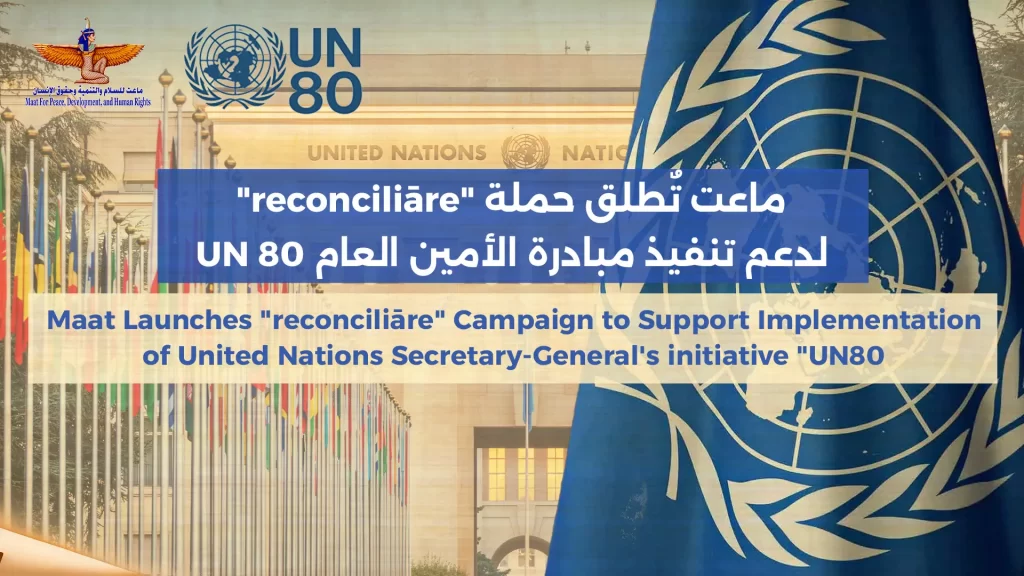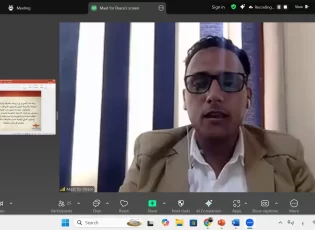“I don’t care about your name, I don’t care about your color, I care about a person, even if I don’t have a title.” These were the words chosen by the artist Mohamed Mounir to conclude the celebration that was held on Tuesday evening, December 16, 2008 in cooperation between the Maat Foundation for Peace, Development and Human Rights and Our Valley Foundation for Human Development, on the occasion of the sixty years since The issuance of the Universal Declaration of Human Rights under the title “Human Rights and Human Development in the Nile Valley: Reality and the Future.” The celebration came within the framework of the interest of both institutions in linking human rights and human development issues on the one hand and their interest in the Egyptian-Sudanese integration and strengthening the bonds between the two sisters, Egypt and Sudan on the one hand. else . The symposium began with an opening speech by Professor Ayman Aqil, Chairman of the Board of Trustees of the Maat Foundation for Peace, Development and Human Rights, in which he focused on the importance of linking human development and human rights by including the human rights dimension in development activities and highlighting the developmental aspect of human rights-related activities, explaining that this approach is what it is called The “human rights approach” which means integrating the human rights approach into development. This issue has been emphasized by many international conventions and reports on development and human rights. He explained that the celebration represents a vivid embodiment of the desired cooperation between human rights organizations and development organizations. Aqeel also pointed out the gap between what was Humanity expects him from the Universal Declaration of Human Rights that came after a grinding global war, and the results that have been achieved on the ground are still not satisfactory and far from what is hoped. This was followed by a word of welcome from Mr. Majid El-Sherbiny, Chairman of the Board of Trustees of the Wadiina Foundation for Human Development and a member of the Shura Council concerned with Egyptian-Sudanese cooperation, who managed the ceremony and directed the interventions among the guests, who began his speech with the importance of linking human development and human rights as human rights will not be achieved in light of the outbreak Illiteracy, endemic diseases and other manifestations of underdevelopment, he also referred to the document on the right to development, which explicitly stipulated the close relationship between human rights and development, which was issued in 1986. He also focused in his speech on the necessities of Egyptian-Sudanese cooperation at the developmental and human rights levels and the importance of such forums in the service of this noble orientation. He also stressed the importance of the role of art in reformulating Arab thought towards achieving human development and respecting human rights, as they are two sides of the same coin. Then the artist Mohamed Mounir, who explained that he could not judge until now, did the High Dam carried the absolute good of Egypt, or did it carry among its folds an evil by separating Egypt and Sudan and making it difficult for freedom of movement between them that was available before across the Nile, as he spoke about the human rights role And developmental art. Then came the speech of the artist, Leila Alawi, a member of the Board of Trustees of the Wadiina Foundation, who spoke about the importance of art in strengthening human rights and its role in comprehensive development and Arab integration, and referred to her visit to the Darfur region in Sudan and the human conditions that people live there, and focused on the conditions of women in the region and the amount of suffering Which she suffers in light of the circumstances of the ongoing civil war there. She also emphasized on working to spread the culture of peace. The representative of the Sudanese embassy in Cairo, Minister Plenipotentiary Abdullah Salem - a representative of the Sudanese ambassador - spoke about the components and requirements of human development in Sudan and how the Sudanese citizen needs his development rights before talking about his political rights, and he presented the fateful relationship between Egypt and Sudan, citing the saying of the Sudanese President’s advisor Mustafa Othman, “The northern capital of Sudan is Alexandria, and the capital of southern Egypt is Juba.” In reference to the developmental needs of the Sudanese people, he cited a Sudanese folkloric saying, which stated “What we need is a post office and a middle school.” Mr. Al-Walid Sayed Mohamed, assistant head of the Sudanese National Congress Party office in Cairo and head of the Egyptian Relations Sector in the office, also spoke about the importance of cooperation at the popular level and at the level of civil society organizations between Egypt and Sudan and its role in achieving Egyptian-Sudanese integration. After that, the keynote speech at the ceremony was Professor Dr. Ali El-Din Hilal, Professor of Political Science and a member of the Shura Council, who provided an explanation of the concepts of human rights and human development and how they are interconnected and complementary and serve in the interest of what is known in the development literature as “sustainable development”, and emphasized the importance of cooperation between institutions Human rights and development institutions and the need for integration between the two activities, indicating that respect for human rights will not be achieved unless the educational, health and economic conditions of citizens are improved, and he indicated Egypt's pride in the existence of one of its sons, the late Dr. Mahmoud Azmy as the rapporteur of the committee for drafting the Universal Declaration of Human Rights 1948, as well as its pride With more than 57 human rights organizations practicing their work freely in Egypt, he also talked about the unity of ties between Egypt and Sudan and the available integration options between them that serve human development and sustainable development in both countries and stressed at the end of his speech that it is necessary to work to achieve equality, justice and freedom in order to achieve development Comprehensive and respect for human rights. At the end of the celebration, the personalities participating in the celebration were honored, as shields were presented to Professor Dr. Ali El Din Hilal, the artist Laila Elwi, the artist Mohamed Mounir, and His Excellency Ambassador Abdel Moneim Mabrouk, the Sudanese ambassador in Cairo, who was received on his behalf by the Minister Plenipotentiary Abdullah Salem, in appreciation of their roles in serving the cases. Human rights, development and Egyptian-Sudanese cooperation. The celebration was attended by a large number of media outlets, journalists, researchers, academics and civil society activists from Egypt and Sudan.
shortlink: https://maatpeace.org/en/?p=31056










